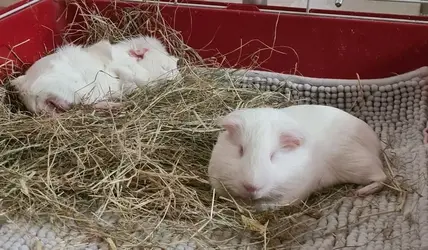Please plan now for the coming hot days!
Here are just some important measures but there are lots more. Please read our advice; we'd rather not need to help you with your piggies suffering from overheating, heat stroke and any resulting loss of appetite but with helping you to get your piggies safely through the coming heat spike and this summer.
Please make sure that you never let your piggies come into direct contact with ice and the full blast of fans and air cons and that double shade is no protection from a full-on sunheated breeze blowing into the shade.
View attachment 205463
Keeping your piggies cool
- Give your
long-haired piggies a welcome summer haircut so they are not lugging the equivalent of a skisuit around a tropical beach. They will be ever so grateful to you; and you can easily prevent the higher risk of overheating for long-hairs.
Our hair cutting guide has both videos and pictures to show you how to best go about it:
An Illustrated Guide to Hair Cutting
- Put your hot weather measures in place NOW.
Please keep in mind that just one measure may not be enough but
that lots of little measures that do not cost much and do not impact on the environment as badly are actually very effective in combination - and that you can also profit from a cooler room/flat/house as much as your piggies!
View attachment 205465
Of one the lowest impact/cost and most effective ways of keeping indoors temperatures down is not the most sightly but it is a good way of recycling old bedding to keep the sun off your window glass on the sunny side. In temperatures over 30 C I also soak the sheets with water (if needed repeatedly); when it evaporates, it creates an insulating layer of cool air between the sheets and the windows, keeping indoors temperatures up to 10 C / 20 F lower than outside - without using any extra electricty. The piggy room is behind the blue sheet.
For temperatures over 30 C, we also have bed sheets to cover our upstairs windows at least partially. We fix them by catching them between the opening window panes and the frames. Especially if you do not curtains in your rooms but can still open windows, it is worth a try.
LOTS of practical little tips for both cages and rooms can be found in our hot weather guide - we have listed all possible tips we have come across and tested them for ourselves as to whether they really work:
Hot Weather Management, Heat Strokes and Fly Strike
- Hutches and sheds: Please bring your piggies indoors during heat spikes -
hutches and sheds can become quickly death traps. The temperature inside a hutch is ca. 10 degrees higher than outside. In a pinch, a bathtub or shower floor with an old towel will do but here are more tips on improvised accommodation:
Temporary Housing Solutions?
These comparative temperatures were taken on a warm but not record hot day in 2020 by East Anglian Guina Pig Rescue
View attachment 205602
- Keep any direct sun off your piggy room or at least off your piggy cage
-
Please do NOT open the windows and have a fan blow the hot air straight into the room. It is a common and sadly fatal mistake. Keep in mind that a sun-warmed breeze is a lot hotter than any temperatures in the shade.
Open your window and allow the fan blow in air only once the outside breeze and air is cooler than indoors. If possible create cooling through drafts first thing in the morning and in the evenings.
- Gel packs: Please be aware that they can be fatal if your piggies get to gnaw on them and digest any gel. Cooling elements from a cool box or a three quarters filled frozen water bottle are a safer option. Please always make sure that any frozen elements need to be wrapped in fabric and that any gel pack is not accessible to any investigative gnawer.
- If your piggies are ignoring any cooling elements, please rejoice: they are not feeling overheated and you are doing your job right in keeping them cool. Best compliment you can get from your piggies on a hot day!
Any piggies pancaked to the floor and sprawling or quite literally plastered to the least hint of coolness are however feeling too hot. Please do your homework and see whether introducing additional measures can help.
-
Guinea pigs do NOT like to swim for their lives, are very much at risk of secondary drowning (water filled lungs leading to death after the swim) and most don't like water in the first place, not even very shallow water.
Forcing a piggy to swim is outright cruelty and animal abuse.
Can And Should Guinea Pigs Swim?
Lawn time
- Please do not keep your piggies on the lawn or in hutches during the hottest hours of the day and never, ever in full sun in temperatures over 25 C / 77 F. Any hut or hutch can become 10 C / 20 F or even hotter than the ambient temperature within minutes. Beware of any Omelet runs; they are a death trap in heatwaves.
A sun-heated breeze blowing straight into the shade of a big tree can still kill, as several forum members have found out the hard way to their immense upset. Morning trips and evening lawn time on a balmy evening are much better; especially once the outdoors is much cooler and refreshing than the stuffy inside of your house.
- Accustom your piggies slowly to eating lots of grass; it can cause potentially fatal bloat if it hits an unprepared gut.
Feeding Grass And Preparing Your Piggies For Lawn Time
- How to best deal with escapees and preventing escapes in the first place:
Keeping Piggies Safe during outdoor time
Hot weather diet
- Please rather than overfeeding your piggies on watery fruit and veg and then fretting why they do not drink and have diarrhea or bloating,
concentrate on providing drinkable cool water at all times.
Consider adding crushed ice to your water bottles if you are out and changing the bottles with fridge cooled water regularly if you are at home.
-
If you are out all day, you can additionally leave a large piece of cucumber with your piggies. The core of it will stay cool for longer and it is healthier than a big fruit salad. Water melons are of course a lovely and much welcome treat, but they are essentially sugar water in edible form. Piggies have a sweet tooth, just like us. (PS: Melon rind is edible, too).
-
Do NOT serve frozen fruit - they can freeze to the tongue or mouth and can cause serious damage, as seen on this forum a couple of times.
- Keep to a normal diet with leafy greens and cucumber as much as possible in order to avoid tummy upsets. Soft poos are generally a sign that you are overfeeding fresh food.
- If your piggies are not drinking cool water, then you are either over-supplying watery veg or your piggies could be overheated in combination with other symptoms (see chapter below)
.
Piggies do not drink the more fluid you provide, they just take as much as they need, whether it is in edible or drinkable form; it is as simple as that. As long as they have access to water at a drinkable temperature, they will not dehydrate.
Heat exhaustion/strokes and blow fly strike (flesh eating maggots) - know the symptoms
- Please read the guides below (they are also - like all the advice on here - incorporated in our comprehensive hot weather guide above, which I would strongly recommend to bookmark)
so you can spot the signs of heat exhaustion/stroke and blow fly strike (flesh eating maggots) and know what you need to do straight away.
Heat stroke symptoms and what to do
Fly Strike
-
If your piggies are not eating properly or a very flat, you need to see a vet asap as an emergency since heat stroke can kill. Exhaustion and stroke do also affect the heart and can cause full or partial GI stasis (the gut stops working as the body overheats).
In pregnant sows (especially in not great conditions), pregnancy toxaemia in the two weeks before and after birth can also hit; symptoms are very similar.
Babies, pregnant sows, ill or old piggies need extra precautions
Please be aware that these groups are at an increased risk of death and secondary health problems if their still developing, not fully working or overworking immune system is further unbalanced by the extra heat burden.
Make sure that you are extra careful in keeping them cool and safe!
Travelling safely to the vet or away in hot weather
You can find a chapter with lots of practical tips on how to keep your piggies as safe as possible during a journey in hot weather in this link here, especially if you haven't got air con and your car is hot:
Travelling with guinea pigs
I sincerely hope that all these tips will help you to keep your piggies safe and alive over the coming days and this summer.
Don't assume that you already know everything - try out all possible tips if you can find and test out which combination works for you. It can really save lives. The climate is not getting any cooler so you will have to implement more tricks summers to come. When it comes to hot wether, playing it safe is really so much better than being sorry.
I would strongly recommend to bookmark this link here, which contains all the practical advice and detailed tips to all points raised in this thread here. You do not want to search around long in any emergency:
Hot Weather Management, Heat Strokes and Fly Strike




 I'd give them the rest of the lambs lettuce but apparently they've eaten their fill of that for the day.
I'd give them the rest of the lambs lettuce but apparently they've eaten their fill of that for the day.
